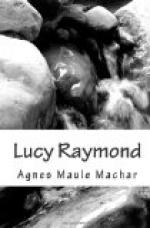They found the place a very quiet one, and the street, though poor, not at all disreputable. Edwin gave the best account of it he could, that Lucy might be able in future, without his escort, to visit Nelly, as she occasionally did, accompanied by her friend Mary Eastwood, who sometimes spent the Saturday afternoon with her at Mr. Brooke’s. Their visits and little gifts of money were very timely, for the poor organ-grinder was growing less and less able to persevere in his uncertain calling; and though Nelly was practising plain sewing, that she might be able to earn something herself, it was not likely that her exertions could bring in much.
In these visits to Nelly the two friends soon found out other poor people in the same locality, even more urgently needing a kind word and a helping hand. In work of this kind, as in most other things, “it is only the first step which costs.” One has only to make a beginning, and straightway one case leads to another, and that interest grows with the work, until to some happy and highly-privileged people it really becomes their meat and drink thus to do their Father’s business.
This new kind of work was a great interest to Lucy, and in planning how best to aid the poor in whom she was interested, and in diligent and happy study, the autumn months passed rapidly away.
XV.
The Flower Fadeth.
“And yet His words mean
more than they,
And yet He owns
their praise;
Why should we think He turns
away
From infants’
simple lays?”
As the autumn deepened into winter, bringing cold, damp days, and chilling, keen winds, little Amy’s strength seemed steadily to decrease, notwithstanding all the care taken to reinforce it by the most nourishing diet that money could command. Every delicacy that could tempt her appetite, every kind of nourishment that could strengthen her system, was tried, without success. Dr. Eastwood had been right in his augury, that her seeming improvement had been only temporary, and that the delicately-organized constitution was not meant for the wear and tear of long life. So evident at last did the decline become, that a consultation was held as to whether it would not be advisable to remove her for the winter to a warmer climate; but the more experienced physicians were decidedly of opinion that taking her away from her home and family would be a needless cruelty, and that, since no human skill could now arrest the disease, it was better to leave the little patient to live, as long as she might, surrounded by the comforts and the kind nursing at home. This opinion was not fully communicated to her parents, but they instinctively felt, what was really the case, that their child was only left in their home because she must ere long be removed from it for ever.




